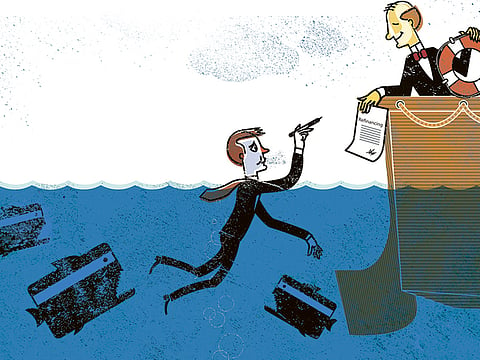Sink or swim? The rise of debt consolidation
UAE consumers move towards debt consolidation to stay afloat

With soaring rents and rising cost of living, many UAE residents have found it all too easy to experience debt. Whether it be a credit card, a bank loan or even borrowing from family or friends, financial advisers say too many people fall into the short-term financial trap of getting money for a quick fix then struggle to make the repayments. In this scenario, experts say debt consolidation — which refers to combining several loans into one single liability, usually a personal loan — is becoming more prevalent in the country.
A previously little-known concept in the UAE, debt consolidation and its advantages are gaining ground as people realise the merits of paying a single instalment each month rather than juggling several debts at a higher interest rate.
Jamal Alvi, Chief Credit Officer for Retail Banking at Abu Dhabi Islamic Bank, says it has been offering debt consolidation for the past five years, but has noted a dramatic increase in refinancing in the last quarter. “We have seen the volumes double in the last three months alone,” says Alvi. “People are trading their 36 per cent a year interest credit-card debt for 8 per cent debt. So they are paying off their debt at a lower rate and a faster pace.”
While this recent surge in popularity is in part due to a marketing drive by the bank, Alvi says it is also because more banks are creating solutions for those in debt as a result of the Al Etihad Credit Bureau — brought in last year to help regulate lending in the UAE — beginning to issue consumer credit reports to financial institutions. Banks in the UAE now have a clearer picture of any outstanding loans a customer has and it becomes a safer, less riskier option for them to lend for refinancing or debt consolidation.
But how do residents fall into debt in the first place? Rising cost of living and high rents are often bandied about as reasons, say experts. In June, Mercer, the human resources consultancy, released its annual Cost of Living Survey. It found Abu Dhabi and Dubai are the 33rd and 23rd most expensive cities in the world. HSBC’s 2015 Expat Explorer Survey shows that 65 per cent of expatriates believe they have more disposable income here than in their home countries, and the UAE remains one of the most attractive destinations globally due to the high salaries on offer.
While the UAE should be a place where expatriates squirrel away savings for the future, unfortunately extravagant spending is a prominent issue, says Khalid Elgibali, Head of Retail Banking and Wealth Management for the UAE and Mena at HSBC Bank Middle East. “We see many people take on debt to fund an expensive lifestyle beyond their means.”
Alvi says many of those who fall into debt typically fit a certain profile and most tend to get into trouble in their 30s. “I would say it is a certain segment of the population. Those who are on low to mid-range packages — people who earn anywhere from Dh10,000 to Dh25,000 a month — are overleveraged and more so because of excessive credit-card debt they have racked up. Living the high life here can get people into trouble. People like to drive expensive cars, go out four days a week. This person wants to attain a more aspirational lifestyle, then their expenses grow, in terms of school fees and housing and others.
“What they do to keep on improving their lifestyle is they start getting credit cards, which are easily available.”
Before they know the situation has spiralled out of control. “By the time they realise things have become untenable, it is often too late — they may be dishing out sometimes 80 or 90 per cent of their income in just debt repayments,” Alvi adds. “That is when we go in and offer them debt consolidation.”
While debt consolidation has its advantages, there are some downfalls too, says Andrew Prince, Financial Planner, deVere Acuma. “A consolidation loan can be a good option as the monthly payments will usually be lower, helping affordability, but the debt is usually spread over a longer term,” says Prince. “What this means is paying the bank higher amounts in interest or profit for the privilege of lower monthly instalments.
“Significantly, unless you change your spending habits and exercise discipline, it is too easy to run up another credit-card debt and be tempted to consolidate that too.” This creates a cycle of debt dependency.
Sign up for the Daily Briefing
Get the latest news and updates straight to your inbox


